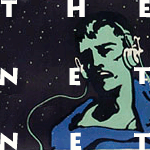Ella Fitzgerald died the Saturday past and the world is a
grimmer place now. It's true she hadn't performed for a few
years; she was bedridden and was suffering badly from
diabetes. But America has lost its greatest singer of songs,
and even when it's cliche enough to say that we'll never see
her kind again, it's too true in this case. No impersonator,
copier, or slavish follower of Ella's style could ever
possibly be her; she always knew exactly how to sing with
unaffected charm and all anybody else could best try to do
is wonder how Ella would've done it.
The seventies and the eighties weren't the best times for
her and her kind: rockinroll music had conquered the world
and there wasn't much room for her sort of joyful playing
with songwriter's songs. But in the nineties, rock got
stale, rap got threatening, and maybe there's a slow revival
of interest in the sort of beautiful expression of wonderful
songs that Ella did best.
Maybe she was a bit too sunny and open, so capable a singer
that she actually could do anything to a song she wanted,
whether it fit or not. Maybe she did too much fluffy pop
music and didn't try to challenge herself further by the
late sixties. Those are awfully curmudgeonly criticisms to
level at this late date. Try not to think about 'em.
There's a rush at the record stores on Ella Fitzgerald CDs
right now. I'll betcha' I couldn't find one in this town if
I tried. But I hope any Jazz radio station that deserves its
broadcasting license will be playing a few Ella Fitzgerald
songs each hour for the next month. Seek some of 'em out.
They're doing you a favor. Kick back and enjoy.
==
There is no inheritor to Ella Fitzgerald's crown. She made
it and retired it and it's going in a museum now. But
Cassandra Wilson is going to become a special figure in her
own right, and I can't wait to see what happens.
She hit her groove an album ago with "Blue Light 'Til Dawn",
and is exploring it further with "New Moon's Daughter", a
dark, spare, rich album of rarefied sounds and taste.
Cassandra's voice owes more to duskier-toned singers than
Ella. She carries reminders of Billie Holliday and Nina
Simone in her voice, and in her selection of music. She
covers Lady Day's great song 'Strange Fruit', using a
rattling dobro and lurching bass line to turn it into a
brooding meditation on human cruelty, nearly stripping it of
irony. But for most of the album, she touches on lighter
topics than racism, although never turning sunshiny and
bright.
Nearly the entire album rates high on the johnson factor, if
for no other reason than because of her soft, intimate
singing and spare arrangements throughout. Even when the
songs touch on dark subjects (racist lynchings in "Strange
Fruit", the sorrow of loss in "I'm So Lonesome I Could
Cry"), the warmth of her voice becomes soothing, although
never complacent.
Cassandra's selection of covers is interesting, too: there's
a song from U2 ("Love is Blindness"), one from Hoagy
Carmichael ("Skylark"), Hank Williams ("I'm So Lonesome I
Could Cry"), and even the Monkees ("Last Train to
Clarksville"). In the hands of a lesser artist, this
eclecticism would be homogenized by a limited stylistic
palette or demonstrate too many of the performer's
weaknesses. Cassandra Wilson is one of the few singers (Ella
is another, of course) who has impeccable taste in songs,
seeing even the strengths in otherwise fluffy ditties as
"Last Train to Clarkesville", and making them her own.
Hardly anybody can sing with such expressive love and care
without sounding forced or mawkish. Cassandra can, and she's
great in all ways. Not the next Ella, but when she's this
good, who cares?



